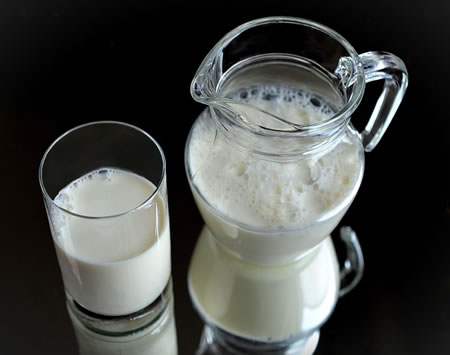For people avoiding cow's milk due to allergy, lactose intolerance or other reasons, almond milk and soymilk are two of the most popular choices. Their popularity has led to many different options within each category, so check labels since nutritional content varies substantially.
The calcium-fortified versions of soy and almond milk provide calcium amounts similar to cow's milk (and some may provide fortification beyond the 30% of Daily Value found in cow's milk). Beyond that, they are quite different nutritionally.
For protein, soymilk is closer to cow's milk, providing 6 grams in an 8-ounce glass compared to the 8 grams in cow's milk.
Almonds themselves are packed with protein, but almond milk is not, supplying only 1 gram per 8-ounce glass (less than you get in a slice of bread).

Calorie and carbohydrate content varies substantially.
Unsweetened soymilk in regular or "lite" form is similar in calories to either 1% (low-fat) or skim (nonfat) cow's milk (around 70-110 calories per 8-ounce glass). Milk, however, usually has more grams of carbohydrates and sugars (11 grams).
Unsweetened almond milk contains about half the calories of soymilk, but sweetened versions (including vanilla) add from 2 to 5-1/2 teaspoons of sugar per cup, adding an additional 30-90 calories and 8-23 grams of carbs.
Silk ® Original Soymilk | Silk ® Original Almondmilk |
Cow's milk is highest in potassium, which helps control blood pressure, followed by soymilk; almond milk is much lower.
On the other hand, almond milk is lower in sodium and supplies half of the daily recommended amount of vitamin E.For vegans and others who have trouble getting the heart-healthy omega-3 fats, one version of soymilk comes with added DHA, one type of omega-3 fat.
Other choices include coconut milk and cashew milk, which also come in unsweetened and sweetened versions.
Unsweetened coconut milk contains 45 calories and less than 1 gram of carbohydrate per serving, while unsweetened cashew milk provides 25 calories and 1 gram of carbohydrate.
Sweetened coconut milk provides 90 calories and 9 grams of carbs, while sweetened cashew milk has 80 calories with 14 grams of carbs.
Consider what nutrients you are counting on your milk choice to provide, and choose accordingly. Read labels among the specific choices to find what best meets your needs.
Sources: Karen Collins, MS, RDN, CDN, FAND; FDA; Silk/WhiteWave











